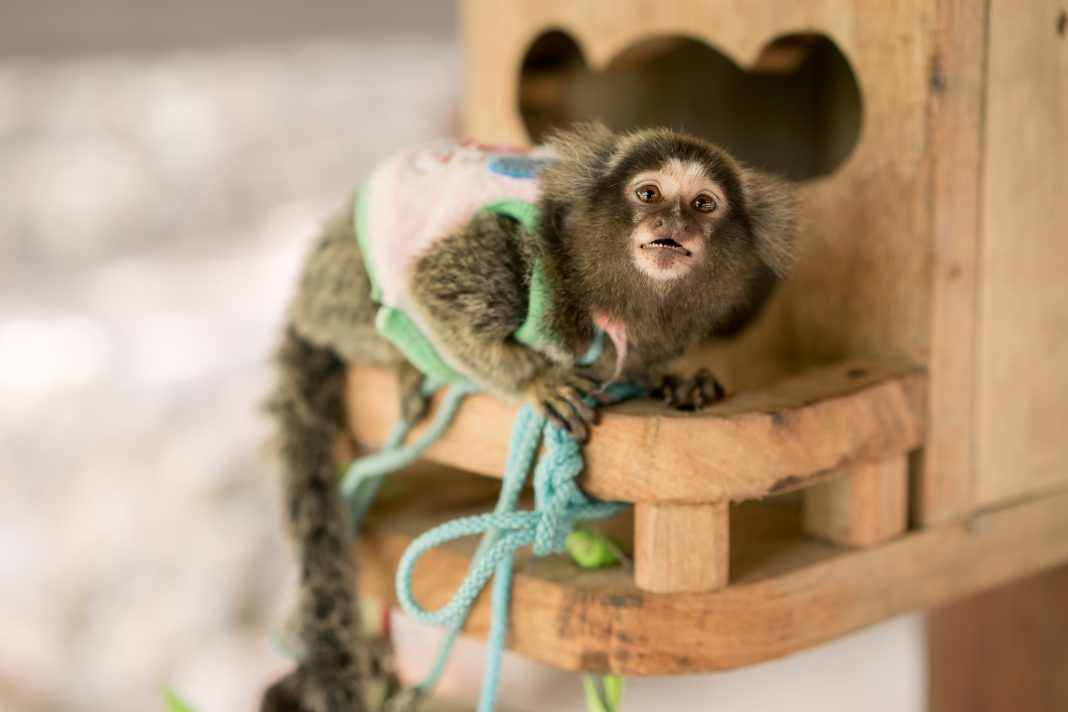Dr Melissa Seaboch explores the potential drivers of the pet primate trade in the U.S. and the troubling impact on both animals and owners
Little is known about the pet primate trade in the United States and other non-habitat countries. It is widely reported that there are 15,000 pet primates in the U.S., but the source of this statistic is unknown. For comparison, up to 7,500 pet primates are licensed in the United Kingdom. This number does not include marmosets, the most commonly kept pet primate in the U.K. and the U.S., so there may be as many as 20,000 pet primates in the U.K.(1, 2)
To better understand the prevalence of pet primate ownership in the U.S., we initially collected advertisements offering pet primates for sale from six exotic pet websites over a year. (3)
We found advertisements for over 550 primates for sale, with marmosets and lemurs being the most common. This underestimates the number of pet primates because we only sampled a small number of websites. Pet primates are also for sale through other outlets, including websites, private and commercial breeders, social media, auctions, and pet stores.

Understanding the pet primate trade: Why do people own pet primates?
Reasons for owning a pet primate are varied. Some owners want a pet primate for the same reason other people might want a dog or a cat – for companionship. Some owners express wanting a pet primate as a surrogate child or as another member of the family to love and spoil, and pictures they post of their pet primate often show them dressed in children’s clothing.
Some are unable to have children of their own, while others explain that their children are grown, and they want a pet primate to fill the void. (4, 5, 6) However, reasons for wanting a pet primate specifically go beyond this desire for a pet.
Some pet primate owners report that their childhood love of books and movies depicting primates encouraged them to purchase a pet primate in adulthood. (5) An increase in the sales of both domestic and exotic animals has followed the release of popular television shows and movies (e.g., Finding Nemo, Harry Potter).
While an investigation of the pet primate trade and sales following the release of TV shows and films has not yet been undertaken, a study of Twitter posts before and after a viral video of a pet lemur in Madagascar found that the number of people expressing a desire to own a lemur as a pet increased. (7) There are thousands of pictures and videos on social media of people with pet primates, with millions of likes and shares. (6) Comments on these posts often express a desire to own one. (6)
Owning an exotic pet such as a pet primate can boost an owner’s ego; some explain that they own a pet primate to show off, impress others, get attention, and because owning a pet primate is cool. Emulating pet primate-owning celebrities (e.g., Justin Bieber) can increase their self-image. (5) Owning a pet primate is not cheap (the average price of a pet primate for sale in our study was $4,500); owning one also advertises the owner’s wealth. (3)
Owning a pet primate can also be a source of income. Some owners have income from social media accounts featuring their pet primates. Pet primates can be hired to perform at events, like children’s birthday parties, and as ‘actors’ for television shows, commercials, and movies. People will also pay for experiences such as touching, feeding, or taking pictures with pet primates. (6) It is unknown whether these experiences subsequently lead the client to want a pet primate of their own.
Why pet primates should not be kept as pets
According to primatologists and veterinarians, primates should not be kept as pets. (3) Many pet primate owners come to regret owning a pet primate, citing their lack of understanding of how aggressive and dangerous an adult pet primate could be. They described their pets as risky, unpredictable, and dangerous. (5)
Some advertisements we examined recommended homes without children and noted that the pet primate could bite anyone at any time. (3) Owners also report being unaware of the time and financial commitment a pet primate would involve. (4, 5)
Sanctuaries are full of pet primates relinquished by their owners, who could no longer care for them, and most of these pet primates are suffering from physical and behavioral problems. (8) The Captive Primate Safety Act, which would ban the interstate trade and private ownership of primates, has been introduced in Congress multiple times, most recently in May 2021, (9) and would substantially decrease the private ownership of pet primates, a goal of most primate experts.
References
- RSPCA. (2009). Primates as Pets: Is There a Case for Regulation? Retrieved from https://www.wildfutures.org/wp/wp-content/uploads/2009/09/Primates-as-pets_Is-there-a-case-for-regulation-2012_LR.pdf
- Svensson, M. S., Nijman, V., & Shepherd, C. R. (2023). Insights into the primate trade into the European Union and the United Kingdom. European Journal of Wildlife Research, 69 (3), 51.
- Seaboch, M. S., & Cahoon, S. N. (2021). Pet primates for sale in the United States. Plos one, 16 (9), e0256552.
- Laufer, P. (2011). Forbidden creatures: inside the world of animal smuggling and exotic pets. Rowman & Littlefield.
- Garrod, B. (2019). The chimpanzee & me. Bloomsbury Publishing.
- BBC Earth. (2022). Dan O’Neil Investigates: Should Primates Be Kept as Pets? [Video]. YouTube. https://www.youtube.com/watch?v=1hET0mIt11Q
- Clarke, T. A., Reuter, K. E., LaFleur, M., & Schaefer, M. S. (2019). A viral video and pet lemurs on Twitter. PloS one, 14(1), e0208577.
- Endcap. (2012). Wild pets in the European Union. Retrieved from https://endcap.eu/wp-content/uploads/2013/02/Report-Wild-Pets-in-the-European-Union.pdf
- Blumenauer, E. (2021). Fitzpatrick and Blumenthal Introduce New Legislation to Ban Private Possession of Primates. Available from: https://blumenauer.house.gov/media-center/press-releases/blumenauer-fitzpatrick-and-blumenthal-introduce-new-legislation-to-ban-private-possession-of-primates]

This work is licensed under Creative Commons Attribution-NonCommercial-NoDerivatives 4.0 International.


